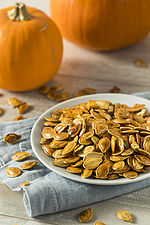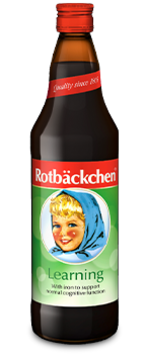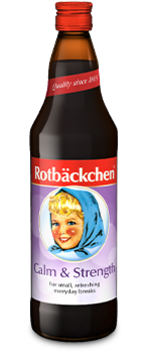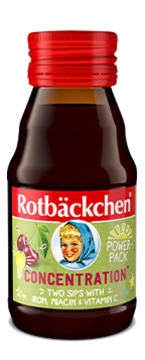Magnesium
Every athlete is familiar with magnesium. Magnesium can do so much more than just maintain our muscle function. Read here to learn about what this mineral can do and how you can always ensure an adequate supply.
 What is magnesium?
What is magnesium?
Magnesium is something for the body, mind and soul; this vital mineral supports our energy metabolism, muscle function, the psyche and nervous system, while helping to reduce tiredness and fatigue - perfect for action-packed playtime with the little ones! Unlike iron or zinc, for example, magnesium is a bulk element. This means the body needs much larger amounts of this mineral than others to stay healthy.
Did you know that magnesium is also found in our earth’s crust? Not only in stones, but plants too. Here, it is a building block for the green pigment called “chlorophyll” and helps plants perform photosynthesis. However, magnesium is also valuable for us. Since we cannot “absorb” it directly from the ground like plants, we must regularly consume a sufficient amount through food.
Magnesium - Effects & special features
![[Translate to Englisch:] Lachendes Kind trägt Kürbis [Translate to Englisch:] Lachendes Kind trägt Kürbis](https://www.rotbaeckchen.de/fileadmin/_processed_/a/3/csm_rotbaeckchen-magnesium-01_76d74aa2c9.jpg)
Magnesium is involved in many processes in the body, particularly important for athletes because it supports normal muscle function. However, it also plays an important role in protein synthesis and cell division. Magnesium also contributes to a normal electrolyte balance in our cells. Electrolytes help to distribute water around the body and supply water to the organs.
Last but not least, magnesium also supports the energy balance and reduces tiredness and fatigue, which helps improve performance situations, like sports. Like calcium, magnesium is also important for maintaining normal bones and teeth. With so many tasks, magnesium still does wonders for our bones.
Magnesium & calcium: Opponents or partners?
For a long time, consuming magnesium and calcium was thought to be a bad combination because the two would inhibit each other’s absorption. However, this logic is now considered flawed; if both substances are taken in the recommended amounts, there are no negative effects.
Magnesium in food
![[Translate to Englisch:] Gemüsekorb mit Tomaten und Karotte [Translate to Englisch:] Gemüsekorb mit Tomaten und Karotte](https://www.rotbaeckchen.de/fileadmin/_processed_/5/2/csm_rotbaeckchen-magnesium-04_c63320bc9c.jpg)
Magnesium is found in many different foods. Foods particularly rich in magnesium can be found in the table below:
| Food | Magnesium per 100g |
|---|---|
| Wheat bran | 480 mg |
| Sunflower seeds | 420 mg |
| Cocoa powder, slightly fat-reduced | 414 mg |
| Quinoa | 275 mg |
| Soybeans, dried | 220 mg |
| Peanuts | 160 mg |
| Oatmeal | 130 mg |
| Lentils, dried | 129 mg |
| Wholemeal rice | 110 mg |
Average values according to Souci, Fachmann, Kraut: Food Composition and Nutrition Tables (7th ed.). Munich: C.H. Beck. 2008
As with other minerals, gentle preparation methods (steaming, blanching, etc.) are recommended to preserve as much as possible, since significant amounts of magnesium can pass into the cooking water.
Daily magnesium requirement
![[Translate to Englisch:] Mann hält Sonnenblume in der Hand [Translate to Englisch:] Mann hält Sonnenblume in der Hand](https://www.rotbaeckchen.de/fileadmin/_processed_/8/3/csm_rotbaeckchen-magnesium-03_bd7394c037.jpg)
The German Society for Nutrition (DGE) has set estimates for your daily magnesium estimates to help you avoid consuming too much or too little magnesium over a long period of time. The amount you need depends on your bodyweight, age and height. This is why it varies according to the phase of life. In addition, the daily requirement increases during pregnancy and breastfeeding.
| Age | Magnesium mg/day - men | Magnesium mg/day - women |
|---|---|---|
| Children between 1 and 4 years | 170 mg | 170 mg |
| Children between 4 and 7 years | 190 mg | 190 mg |
| Children between 7 and 10 years | 240 mg | 240 mg |
| Children between 10 and 13 years | 260 mg | 230 mg |
| Children between 13 and 15 years | 280 mg | 240 mg |
| Youth between 15 and 19 years | 330 mg | 260 mg |
| Adults between 19 and 25 years | 350 mg | 300 mg |
| Adults 25 years and above | 350 mg | 300 mg |
| Pregnant women | 300 mg | |
| Breastfeeding women | 300 mg |
More about vitamins & nutrients

Vitamins & minerals
Want to know what all the valuable micronutrients do, what foods have them and how much you need? Find more information here.
Find out more
Vitamin B
The different members of the vitamin B complex perform different tasks – they take care of energy balance, the nervous system and many other processes in the body.
Find out more
Iron
Iron is one of the most important trace elements in the body. It helps red blood-cell formation and is essential for transporting oxygen through the body. The right iron balance helps you and your family stay healthy.
Find out more


